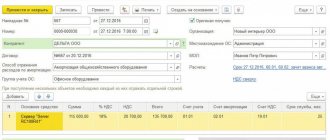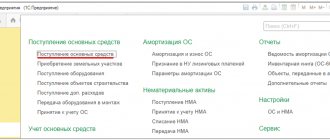Real estate accounting
Real estate accounting is carried out in accordance with these acts:
- Accounting regulations established by Order of the Ministry of Finance No. 26 n dated March 30, 2001.
- Guidelines for accounting for OS No. 91.
the write-off of buildings and other real estate in accounting ?
Accounting should not contradict general rules. There are conditions for real estate to be included in the list of fixed assets (hereinafter referred to as fixed assets):
- Real estate is necessary for conducting the main activities of the company (sale of products, provision of services).
- The facility will be in operation for longer than a year.
- The company does not plan to resell.
- The facility is expected to provide financial benefits. In this case, its acquisition will be considered justified.
The list of these conditions is given in paragraph 4 of PBU 6/01. These rules apply to all fixed assets to which real estate belongs. Accounting is carried out based on the cost of the object. This cost is formed based on the company’s actual expenses for purchase, assembly, and production. All taxes and government fees are deducted from this amount. However, registration fees may be included as expenses because they are associated with the purchase. That is, expenses for state registration of real estate will be written off as current expenses. Write-offs are carried out in accordance with general accounting rules.
Question: In 2021, an organization acquired and registered a property that is used in transactions subject to and exempt from VAT. VAT was accepted for deduction in 2021. In what order should VAT be restored for periods of use of the property in VAT-free transactions in 2019? View answer
Purchasing objects taking into account the new rules is not considered a capital investment.
They are recognized as OS objects on the date of appearance of documents confirming their readiness for operation.
These may be documents such as a transfer and acceptance certificate, permission to put the facility into operation. Depreciation will be calculated on a general basis from the first day of the month following the month in which the property was accepted for accounting. In 2011, the procedure for accounting for objects was changed. In particular, new regulations abolished these conditions:
- Documents on registration of the object are optional.
- Actual operation is not necessary.
- Depreciation is not charged if the property remains on account 08.
How to reflect in accounting transactions for the acquisition of real estate (industrial building) ?
Since 2011, property has been accepted for accounting as fixed assets if it meets these requirements:
- Compliance with the provisions of paragraph 4.5 of PBU 6/01.
- Capital investments are completed.
- There are documents confirming readiness for use.
Registration for inclusion of property in the OS is optional. Depreciation of property will depend on when it is recorded. The month of acceptance for accounting is the month in which investments were completed and the object began to meet the characteristics specified in paragraph 4 of PBU 6/01. For depreciation, it is not necessary to transfer papers for registration. The object can be accepted into the OS on the date of signing the transfer and acceptance certificate.
Accounting
Formation of the initial cost of real estate and the moment of registration
Accounting for fixed assets is carried out in accordance with:
- Accounting Regulations “Accounting for Fixed Assets” PBU 6/01, approved by Order of the Ministry of Finance of Russia dated March 30, 2001 No. 26n;
- Methodological guidelines for accounting of fixed assets, approved by Order of the Ministry of Finance of Russia dated October 13, 2003 No. 91n (hereinafter referred to as the Guidelines).
Clause 4 of PBU 6/01 “Accounting for fixed assets” lists the conditions required for an asset to be accepted for accounting as part of fixed assets. There are four of them:
- the object is intended for use in the production of products, performance of work or provision of services, management needs of the organization, or provision by the organization for a fee for temporary possession and use or for temporary use;
- the object is intended for use for a long time - over 12 months. or normal operating cycle if it exceeds 12 months;
- the organization does not intend the subsequent resale of this object;
- the object is capable of bringing economic benefits (income) to the organization in the future.
The conditions for recognizing an object as part of fixed assets listed in clause 4 of PBU 6/01 are applicable to any fixed assets, including real estate.
By Order of the Ministry of Finance of Russia dated December 24, 2010 No. 186n, changes were made to the list of expenses that form the initial cost of fixed assets - real estate. Paragraph 24 of the Methodological Guidelines for Accounting for Fixed Assets as amended, as amended, entered into force in the 2011 financial statements:
Clause 24: “The initial cost of fixed assets acquired for a fee (both new and used) is recognized as the amount of the organization’s actual costs for acquisition, construction and production, with the exception of value added tax and other refundable taxes... state duties and other similar payments made in connection with the acquisition of fixed assets.”
The new edition eliminates the mention of registration fees associated with the acquisition of fixed assets. Now expenses are associated not with obtaining the right to an object, but directly with the acquisition of a fixed asset.
Thus, from 2011, the costs of state registration of rights to real estate and other similar expenses incurred after the fixed asset item was accepted for accounting will have to be written off as current expenses in accordance with the general accounting rules.
Since 2011, by Order of the Ministry of Finance of Russia dated December 24, 2010 No. 186n, changes have been made regarding the accounting of real estate.
In clause 41 of the Regulations on accounting and reporting in the Russian Federation, approved. By Order of the Ministry of Finance of Russia dated July 29, 1998 No. 34n, a change was made to the rules for assessing accounting reporting items for unfinished capital investments.
…P. 41: Unfinished capital investments include costs for construction and installation work, acquisition of buildings, equipment, vehicles, tools, inventory, other durable material objects, other capital works and expenses not documented by acceptance certificates of fixed assets and other documents ...” .
Costs for the construction or acquisition of real estate objects lose the nature of capital investments and are recognized as fixed assets at the moment when their readiness for use is documented . Such documents include acceptance certificates, permission to commission and other documents provided for by law (clause 41 of the Accounting Regulations).
In clause 52 of the Methodological Instructions for Accounting for Fixed Assets (as amended on December 24, 2010), a change was made for the accounting of real estate objects: “For real estate objects for which capital investments have been completed, depreciation is accrued in the general manner from the first day of the month following the month of adoption object for accounting . Real estate objects, the ownership rights to which are not registered in the manner prescribed by law, are accepted for accounting as fixed assets with allocation in a separate sub-account to the fixed assets accounting account.” Previously, paragraph 52 of the Methodological Instructions contained the phrase “from the first day of the month following the month the facility was put into operation.”
Thus, from 2011 the following are excluded:
- requirement for the fact of transfer of documents for state registration;
- requirement for actual operation of real estate;
- a provision according to which depreciation was accrued on such an object even if it remained on the account. 08;
- provisions according to which the initial cost of a completed object was actually formed before its registration with the recalculation of the amount of depreciation accrued after commissioning based on the final cost.
Thus, since 2011, real estate has been accepted in accounting as a fixed asset if:
1) it corresponds to the characteristics of clauses 4, 5 PBU 6/01
2) capital investments for it have been completed.
3) documented readiness for use.
State registration of rights to recognize such an object as a fixed asset is not required.
If the costs of construction and installation work and the acquisition of real estate are not documented in acts of acceptance and transfer of fixed assets and other documents, then they are classified as unfinished capital investments. Such documents include acceptance certificates, permission to commission and other documents required by law.
Depreciation of real estate since 2011 also does not depend on the fact of transfer of documents for state registration of ownership. Depreciation should be calculated from the 1st day of the month following the month the object was accepted for accounting .
Now the moment when depreciation of real estate begins is determined depending on the month of its acceptance for accounting. And this is the month in which capital investments are completed and the property is formed as a separate fixed asset that has the characteristic features listed in clause 4 of PBU 6/01.
The buyer who purchases (receives) a property under a purchase and sale agreement no longer has to wait for the documents to be submitted for state registration of ownership. Starting from 2011, a real estate item purchased under a purchase and sale agreement should be accepted for accounting as part of fixed assets at the time the property acceptance certificate is signed with the seller.
In turn, the seller must now write off the sold property from accounting on the date of signing the transfer and acceptance certificate, and not at the moment of transfer of ownership to the buyer, as was previously the case.
Organizational property tax
According to paragraph 1 of Art. 373 of the Tax Code of the Russian Federation, taxpayers of property tax are organizations that own property recognized as an object of taxation in accordance with Art. 374 Tax Code of the Russian Federation.
In accordance with paragraph 1 of Art. 374 of the Tax Code of the Russian Federation, the objects of taxation for Russian organizations are movable and immovable property (including property transferred for temporary possession, use, disposal, trust management, contributed to joint activities or received under a concession agreement), accounted for on the balance sheet as fixed assets funds in the manner established for accounting .
The moment of deregistration of a property from the seller's organization is now determined by the date of signing the acceptance certificate of the said property to the buyer.
Starting from 2011, the financial department provides the following explanations regarding property tax.
The Ministry of Finance of Russia in Letter No. 03-05-05-01/44 dated June 17, 2011 indicates that a property is subject to property tax from the buyer, regardless of the date of state registration of ownership. This is justified by the fact that the asset is accepted for accounting as fixed assets while simultaneously meeting the conditions established by clause 4 of PBU 6/01.
Thus, an organization receiving a piece of real estate, the ownership of which is subject to state registration, must take it into account at the time of actual receipt, regardless of the fact of state registration of ownership rights.
Acceptance of real estate for registration
The initial cost of the object will include these components:
- If the object is purchased: the cost of the property set by the supplier, as well as the costs of bringing the objects into a condition suitable for use.
- If the company is building real estate: funds paid to the contractor.
Other costs may be included in the expenses associated with the activities of the company. These expenses must be taken into account in the period in which they arose. Let's look at the transactions that are relevant when accepting a property:
- DT08 KT60. Accounting for expenses for the acquisition or construction of objects. It is assumed that these costs are included in the original cost.
- DT01 KT08. Acceptance of objects for accounting.
Postings are made on the basis of documents. For example, this is an act of acceptance and transfer of real estate.
Accounting for property reconstruction under the simplified tax system
Real estate reconstruction is an improvement of the property. Reconstruction costs are included as expenses. They are recognized as expenses from the date of operation of the facility. Expenses should be written off evenly until the end of the reporting period. Only those expenses that were actually paid are taken into account.
Formation of initial cost under OSNO
If the company uses OSNO, the initial cost includes these costs:
- The cost of constructed or acquired property.
- Interest on a loan taken for purchase or construction.
- Expenses to improve an object so that it becomes suitable for use.
- Other expenses associated with the acquisition (for example, commissions).
If a company uses OSNO, it is also not necessary to send documents for state registration for accounting and depreciation.
Registration of a property before state registration when it is received free of charge
In accounting (budget) accounting, transactions for the gratuitous receipt of real estate, the rights to which are subject to state registration, are reflected as follows:
- Increase in account 01 - the property is reflected on the off-balance sheet until the moment of state registration of the right;
- Debit KRB X.101.1X.310 Credit KDB X.401.10.180, X.401.10.151, X.401.10.152, X.304.04.310 - after state registration of the right, the property is accepted for accounting as part of fixed assets (clause 7 Instructions No. 162n, clause 9 of Instructions No. 174n, clause 9 of Instructions No. 183n);
- Decrease in account 01 - the value of the property is written off from off-balance sheet accounting after its state registration.
More on the topic: FCD plan in 2021
Published 12/06/2017
Features of accounting for objects from the seller
If the property has been sold, its value is written off. Sales revenue is recognized in these cases:
- The company has ownership of the object, confirmed by documents.
- The amount of proceeds from the sale is known.
- There are indications that the firm will benefit economically from the sale.
- The buyer received ownership of the object.
- The costs of the operation can be clearly established.
Income and expenses from write-offs will be credited to profit and loss.
Accounting entries
The selling company makes the following transactions:
- DT02 KT01. Write-off of depreciation accrued on an object.
- DT45 KT01. Write-off of residual value.
- DT62 KT91.1. Proceeds from sale.
- DT91.2 KT68. VAT accrual.
- DT91.2 KT45. Write-off of residual value.
- DT91.9. KT99. Fixation of profit.
Tax documentation must reflect sales income, expenses, and profit from the sale.
Sale of real estate: different rules for calculating income in accounting and tax accounting
When selling a building or premises, the seller must record income and calculate taxes on it. What specific taxes are depends on the taxation system used. If a company applies a general taxation system, then upon sale there is an obligation to calculate two taxes: VAT and income tax. If the property is a residential building or premises, then a VAT benefit applies (clause 22, clause 3, article 149 of the Tax Code of the Russian Federation).
Since ownership rights to any real estate are subject to state registration, when selling there is almost always a time gap between the transfer of the object under the deed and the registration of ownership of it. This circumstance leads to the emergence of temporary differences, which, in turn, lead to the emergence of a deferred tax asset (DTA). This is due to the fact that the moment of recording the proceeds from the sale of real estate in accounting and tax accounting is different.
In tax accounting, the date of sale of real estate is the date of transfer of this property under a transfer deed or other document on the transfer of real estate (clause 3 of Article 271 of the Tax Code of the Russian Federation). In accounting, to reflect revenue, the transfer of ownership from the seller to the buyer is important (clause “d”, clause 12 of PBU 9/99 “Income of the organization”). Therefore, in accounting, income from sales is shown only at the moment when the ownership right is registered to the new owner. This difference leads to the formation of temporary differences, and therefore to the formation of a deferred tax asset.
As for VAT, here, as well as for the purposes of calculating income tax, the fact of registration of the transfer of ownership does not matter. What is important is the fact that the object is transferred to the buyer according to the act (clause 16 of Article 167 of the Tax Code of the Russian Federation). It is at this moment that it is necessary to include the value of the sold property in the VAT tax base and, accordingly, issue an invoice for it.
Accounting for the purchase of objects
The company that purchased the property takes it into account regardless of whether the property is registered. Real estate is included in fixed assets, and therefore is included in a special depreciation group. From the first day of the month following the month of acquisition, depreciation begins to accrue. For tax accounting of objects, these conditions must be met:
- Papers have been sent for registration.
- The property has been put into operation.
As a rule, enterprises use the straight-line method of calculating depreciation. The rate is based on the useful life period. The time during which the property was used by the previous owner is deducted from this period. The useful life period can be determined by these methods:
- Based on total useful life.
- Remaining term.
If the second method is used, the company must have a document confirming the period of operation of the object by the previous owner. In the first option, the company sets the deadline independently. When purchasing real estate, the buyer must make these entries:
- DT08 KT60. Receipt of object.
- DT01 KT08. Acceptance of real estate for accounting as fixed assets.
- DT19 KT60. Allocation of VAT amount.
- DT68 KT19. Acceptance of VAT deduction.
Opposite each posting should be the date on which the accounting was completed.
Accounting (budget) accounting
The accounting (budget) accounting procedure in institutions is regulated by:
- In government institutions - Instructions, approved. By Order of the Ministry of Finance of the Russian Federation dated December 6, 2010 No. 162n (hereinafter referred to as Instruction No. 162n);
- In budgetary institutions - Instructions, approved. By Order of the Ministry of Finance of the Russian Federation dated December 16, 2010 No. 174n (hereinafter referred to as Instruction No. 174n);
- In autonomous institutions - Instructions, approved. By Order of the Ministry of Finance of Russia dated December 23, 2010 No. 183n (hereinafter referred to as Instruction No. 183n).
At the same time, accounting (budget) accounting in government institutions is regulated by the Instruction, approved. Order of the Ministry of Finance of the Russian Federation dated December 1, 2010 No. 157n (hereinafter referred to as Instruction No. 157n), which is common for any type of institution. According to paragraph 36 of Instruction No. 157n, the inclusion of real estate objects, the rights to which are subject to state registration, into fixed assets is carried out on the basis of primary documents with the mandatory attachment of documents confirming the state registration of the right or transaction. This means that a property can be accepted for balance sheet accounting only after state registration of the right.
More on the topic: Correcting mistakes of past years using the example of fixed asset accounting (video)






